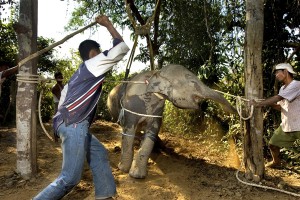In order to have any serious discussion and understanding about elephant conservation in Thailand and Asia – whether it’s about elephants used in the illegal logging trade, or elephants used in tourist camps for rides and other “entertainment” – it’s important to understand how they ended up there and the process each has been put through in order to willingly submit to painting pictures, having tourists put on their backs, or hauling logs up and down steep mountain ravines. It’s further important to understand that, unless you’re lucky enough to come across elephants in the wild while visiting Asia, with only rare exceptions every elephant you encounter will have been both literally and figuratively broken in a process called phajaan.All beings tremble before violence. All fear death, all love life. See yourself in others. Then whom can you hurt? What harm can you do?
-Buddha
Every elephant.
The ritual has been around for hundreds of years, founded on the belief that a tribal shaman could expel the wild spirit from an elephant, thereby leaving it compliant and under the control of its mahouts. But the truth is far more grim. Regardless that Thailand looks upon working elephants as livestock with no legal protection, elephants have never been domesticated and by nature will not willingly submit to being removed from their mother’s side and made to work. In order to do so, still-nursing calves are forcibly separated from their mothers and placed into a tightly constricted pen known as a “crush.” There they are tied down in such a way that they can’t move or turn around, and are unable to sit or even lie down. Over the next several days they are deprived of food and water, and they’re not allowed to sleep. Instead, hour after hour, day after day, they are repeatedly beaten, burned, and stabbed with an array of crude weapons. Hit again and again over the head, back, and legs with bamboo sticks that have nails pushed through the ends, stabbed over and over in their delicate inner ears, struck repeatedly on their sensitive trunks — tortured in an unending variety of unimaginable ways.
It’s the first time a young elephant will have been without its mother or other family members at its side, and even though they trumpet and shriek loudly, crying nonstop, the graphic abuse will continue until those involved are satisfied that the elephant’s spirit has been irrevocably crushed and that, so terrorized and fearful of being hurt further, it will submit to being trained. Bloodied and broken, the baby elephant is now ready to learn how to perform tricks and tasks with little protest; and whether put to work in the illegal logging industry, the tourist industry, or begging in the streets of Bangkok or Chiang Mai, the elephant will continue to be beaten as a reminder of their place and to keep them compliant.
Half of the elephants put through phajaan will die. Of those that survive, “About half will go mad,” says Elephant Nature Park founder Lek Chailert. “This brutality can make them aggressive and dangerous.”
If you see an elephant in Thailand, this is what it’s been put through. While the videos below contain graphic footage that may be difficult for some to watch, imagine what it must be like for the elephants forced to endure this. And trust me, there are more explicit videos than these vividly detailing what happens during a phajaan.
Tourists visiting Thailand and other countries in Asia need to understand that their money directly supports and legitimizes these abuses. If you visit a trekking camp and ride elephants, if you give money to an elephant begging on the street, if you buy a picture painted by an elephant, you are directly contributing to a cycle of violence and terror.
Please, don’t.
If these types of activities are offered by your tour company or hotel, tell them “no,” and just as importantly tell them the reasons why. You vote with your money. If it becomes unprofitable for them to offer activities like these they’ll stop. Instead, consider visiting or otherwise supporting sanctuaries like Elephant Nature Park and Boon Lott’s Elephant Sanctuary, both of which rescue abused and injured elephants and provide them with the love, care, and home to simply be… elephants. To simply be. A few hours in the presence of an elephant’s beauty and intelligence will teach you far more than any forced ride or painting could.
Recently, tour operator Asian Oasis dropped all elephant rides from their travel packages. “With immediate effect, Asian Oasis is announcing that it will no longer provide elephant rides with all tour packages. […] By avoiding elephant rides and shows, we believe that both travellers and tour operators can show strong support towards the end of animal cruelty in tourism.” Asian Oasis, and similar tour and travel companies, should be publicly lauded for their decision to do this and financially supported as an example of the positive difference such a decision can make. By providing a financial incentive not to participate in the exploitation of elephants we create the means to put an end to a horrible cycle of abuse once and for all.
Too often we compartmentalize and rationalize actions and choices because we don’t want our conscience burdened with guilt, even though we know in our hearts what we’re doing is less than wholesome. As Gandhi said: “Be the change that you want to see in the world.” The only way phajaan and similar acts of abuse will ever be stopped is if we make an active choice to prevent them from happening. The only way serious elephant conservation aims in Asia can be achieved is when the elephants are returned to being the symbols they are for the right reasons – not as livestock, and not as broken and beaten entertainment. Follow your conscience and vote with your money. Then, tell others and help spread the word. It’s up to us. It really is.
 kimpluscraig.com
kimpluscraig.com









